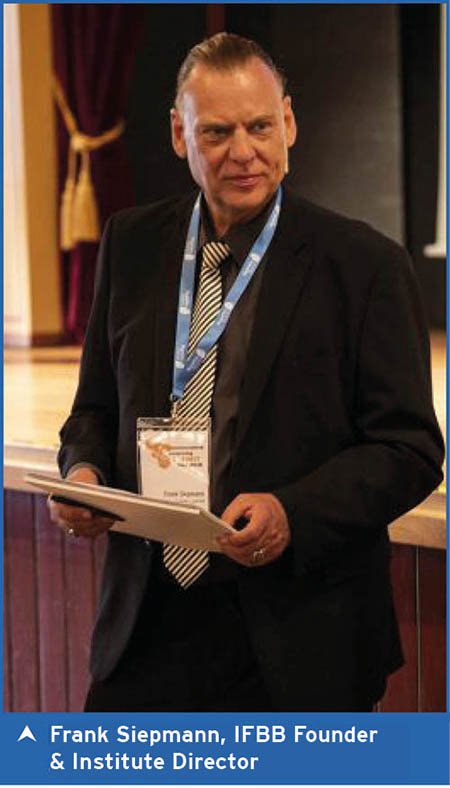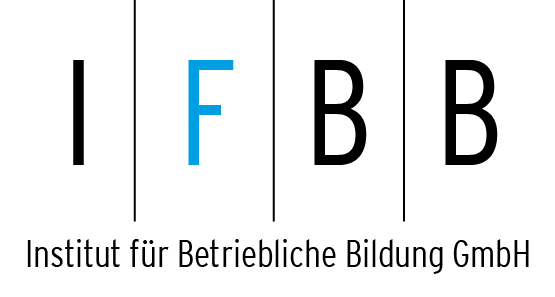
In the digital transformation, corporate education is increasingly taking on a key role
 After an almost three-year preliminary phase, Siepmann Media founded the private research institute “IFBB – Institut für betriebliche Bildung” as a spin-off in late summer 2020. The private research institute IFBB – Institut für betriebliche Bildung (Institute for Corporate Education) participates in R&D projects on the digital transformation of corporate education and makes it its business to address the unresolved transfer issue between science on the one hand and corporate practice on the other.
After an almost three-year preliminary phase, Siepmann Media founded the private research institute “IFBB – Institut für betriebliche Bildung” as a spin-off in late summer 2020. The private research institute IFBB – Institut für betriebliche Bildung (Institute for Corporate Education) participates in R&D projects on the digital transformation of corporate education and makes it its business to address the unresolved transfer issue between science on the one hand and corporate practice on the other.Working and learning in a continuing education society
The digitization of the world of work is reshaping corporate education. As in previous epochal upheavals, work organization and qualification requirements are largely determined by technological innovations, but not the way in which qualifications and vocational training are provided. In the digital transformation, the focus is on in-company training: work-based learning becomes a constitutive component of work, learning concepts such as eLearning, new forms of learning and digital competencies are introduced, and work is designed to promote learning and competencies. This is happening against the backdrop of the transformation from a training society to a continuing education society that began as early as in the 1980s. In this society, continuing vocational training is the largest area of education, and in-company training is by far the largest area of corporate education. Proven standards of continuing education in the workplace are to be interlinked with the education system and strengthen lifelong learning and the willingness of the population at large to engage in education.
The digitization of the world of work is reshaping in-company continuing education. As in previous epochal upheavals, work organizational and qualification requirements are largely determined by technological innovations, but not the way in which qualifications and vocational training are provided. In the digital transformation, the focus is on in-company training: work-based learning becomes a constitutive component of work, learning concepts such as eLearning, new forms of learning and digital competencies are introduced, and work is designed to promote learning and competencies. This is happening against the backdrop of the transformation from a training society to a continuing education society that began as early as the 1980s. In this society, continuing vocational training is the largest area of education, and in-company training is by far the largest area of continuing training. Proven continuing education standards in the company are to be interlinked with the education system and strengthen lifelong learning and the willingness to learn of the broad population in the continuing education society. The IFBB – Institut für betriebliche Bildung (Institute for Corporate Education) sees itself embedded in this context.
Community of Practice – 5 Shell Model “Corporate Education”
As a spin-off of Siepmann Media, the IFBB has extensive experiential knowledge and recognized expertise in the digital transformation of corporate education, as well as access to one of the largest immediate networks of project-responsible stakeholders in education and training. As a leading specialist publisher, Siepmann Media has been addressing and documenting the digital transformation in companies and organizations for more than 15 years.
Against this background, Siepmann Media has been issuing cross-media publications since 2005: the “eLearning Journal” (since 2005, reach: 150,000+ continuing education professionals), the yearbook “Knowledge Management & eLearning” (since 2010), and the eLearning BENCHMARKING study (since 2014). In these publications, trends, developments and innovations in training and further education of companies and organizations are made visible. In addition, Siepmann Media has been organizing the eLearning SUMMIT Tour annually since 2012, a supra-regional, inter-company and practice-oriented exchange of experience and knowledge both in the presence and in the digital space. In 2021 alone, the eLearning SUMMIT Tour created meeting spaces for more than 18,500 training professionals, scientists, and stakeholders in professional and continuing education from Germany, Austria, and Switzerland in over 65 hybrid congresses, conferences, and virtual formats.
In January 2018, the Community of Practice (CoP) “Betriebliche Bildung” was created with the participation of scientists from various disciplines and 70+ other industry stakeholders from eLearning-using companies and organizations, and finally, in summer 2020, the spin-off of the start-up “IFBB – Institut für Betriebliche Bildung”. The CoP “Betriebliche Bildung” is a community of practice, structured in a 5-shell model, which brings together, among others, further education specialists, IT professionals, personnel developers, further education trainers and eLearning managers, both from large companies and, in particular, from SMEs, on the basis of the development of the digital transformation of corporate education. Going beyond a mere exchange of experiences, the aim is to gain systematic and sustainable insights that enable the digital development of corporate education to be grasped situationally and strategically and to be intertwined with eLearning and digital competence development. The IFBB is active in the community of practice.
Unresolved transfer issues
In the area of corporate education, there is an unresolved transfer issue between science on the one hand and in-company practice on the other. Continuing education strategies and measures in companies often develop in an elaborate, in-company trial-and-error process that is tied to the existing competencies of the specialists involved, but at the same time shows a strong need for an inter-company exchange of experience. Many experts in continuing education would like to have the direct involvement of inter-company expertise in the project conception, in the course of the project or in the project evaluation, for example for the interpretation of project progress, for impact forecasts of new learning scenarios or for the implementation of competence acquisition in the work process.
On the other hand, it can be seen that practice is ahead of science in many areas of application and use. Empirical analyses and studies only capture the digitization of the world of work to a limited extent, and central fields of action and activity in the digital transformation, such as digital competence development, the activities of continuing education specialists, and the role of stakeholders, are blind spots in the research landscape. In the sense of action and use research, a mutual transfer at eye level is required here, in which the IFBB sees itself embedded. In doing so, the IFBB does not primarily follow technical and economic objectives of the digital transformation of corporate education, which are all too often the focus of research and development in this area. Rather, the IFBB strives for a holistic understanding of the topic, which explicitly takes into account the role and needs of employees.
These challenges will be addressed by the IFBB and the CoP docked to it. The self-imposed goals include, in particular, the initiation and support of practice-oriented action and utilization research as a formative transfer partner, the dissemination of practice-relevant project results as a summative transfer partner, the support of the implementation of market-relevant innovations in in-company training (e.g. Innovation Hub, Living Lab) and as a think tank as a link to vocational training policy regulatory work with the involvement of the social partners.
Action & Use Research
One of the primary tasks of the IFBB is the interlocking of stakeholders of corporate education with science as well as with actors of vocational and further education. This interlocking is implemented through the initiation of/or participation in R&D projects, the think tank “Corporate education” as well as through public relations and agenda setting.
The IFBB participates in publicly funded R&D projects on digital business development and thus directly participates in innovative advances in knowledge in business digitization. In doing so, the IFBB follows the principles of linking science and practice, bringing together experimental and theoretical knowledge, and tending to neglect the separation between researchers and practical professionals. Fundamentally, it is about the reference of the research process to actions and their reference back to the research process after practical developments. The IFBB focuses on the approach of Design Based Research (DBR), which is to be understood as a further development of action research. The research approach is particularly suitable for complex, largely indeterminate developments and promises a high level of acceptance and impact in practice. Methodologically, the approach is to be seen in connection with procedures of design thinking and agility.
The interdisciplinary advisory board broadens our perspective
To support this challenging work, the IFBB has appointed an advisory board whose membership largely reflects the most important scientific and social forces in this complex field of research and development. The members of the advisory board represent the scientific disciplines focused on in-company training, publicly funded research institutes and the social partners. Since corporate education in Germany also has strong similarities with that in Austria and Switzerland as well as the fact that all three countries have unique vocational training systems, they are also represented on the advisory board.
In addition, the IFBB will expand the existing structures of the CoP “Corporate Education”. Roundtables and think tanks will continuously identify acute needs, develop recommendations for action as well as guidelines, and jointly define standards for corporate education that focus in particular on commonalities and strengths of the education and training landscapes in Germany, Austria, and Switzerland and build on these. In addition, the CoP will serve as an interface for formative transfer in IFBB research projects. This will enable the IFBB to address relevant actors and stakeholders of in-company training (e.g. HR department, works council, executives, training managers, employees) in a differentiated manner during the entire project duration in order to identify the needs and concerns of companies at an early stage and to incorporate them into the project. In addition, CoP Milestone results can be iteratively tested for practical relevance and suitability.
In addition, the IFBB will contribute its scientific expertise to Siepmann Media’s operational business. Specifically, the IFBB will support the conception, interpretation and evaluation of the annual eLearning BENCHMARKING study, which generates key figures from around the world with over 1,500 study participants. Furthermore, Siepmann Media will draw on the expertise and competencies of the IFBB for the evaluation of the eLearning AWARD.
Yours sincerely,

Frank Siepmann
Institute Director IFBB

